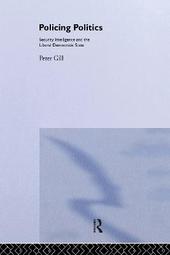
|
Policing Politics: Security Intelligence and the Liberal Democratic State
Hardback
Main Details
| Title |
Policing Politics: Security Intelligence and the Liberal Democratic State
|
| Authors and Contributors |
By (author) Peter Gill
|
| Series | Studies in Intelligence |
|---|
| Physical Properties |
| Format:Hardback | | Pages:384 | | Dimensions(mm): Height 224,Width 156 |
|
| ISBN/Barcode |
9780714634906
|
| Classifications | Dewey:327.1241 |
|---|
| Audience | | Undergraduate | | Postgraduate, Research & Scholarly | | Professional & Vocational | |
|---|
|
Publishing Details |
| Publisher |
Taylor & Francis Ltd
|
| Imprint |
Frank Cass Publishers
|
| Publication Date |
1 February 1994 |
| Publication Country |
United Kingdom
|
Description
Numerous allegations of abuse of power have been made against the domestic security intelligence agencies in the UK - police special branches and MI5. These include the improper surveillance of trades unionists and peace activists, campaigns of disinformation against elected politicians and the summary shooting of people believed to be engaged in political violence. Although far-reaching enquiries have been conducted into similar agencies in other liberal democracies, and the end of the Cold War has brought dramatic change to security agencies in Eastern Europe, the UK agencies have remained aloof from anything more than marginal organizational change. Peter Gill develops a framework for the comparative analysis of security agencies, discussing what is known about the operations of security intelligence agencies in liberal democracies and, second, an agenda for research into the UK agencies, including: the ambitious nature of their mandate regarding "national security", "subversion" and "terrorism"; the ways in which the agencies penetrate society and what they do with the information they gather; internal organizational questions such as recruitment and culture; the extent to which the agencies are controlled by ministers; and how the agencies' activities might be overseen by outside political bodies such as parliamentary committees and by citizens in general. Concluding that not enough is known about how these agencies operate in the UK, the book argues the need for a thorough enquiry to investigate allegations, and to make proposals for a more democratic system of security intelligence.
|